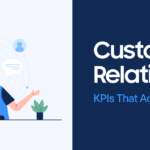With the key role of CRM in e-commerce being online, nearly every interaction with your customers will be digital. Ecommerce-focused customer relationship management (CRM) software is one of the few tools that can capture these exchanges and help you use them to run a better business.
When everyone is selling something — and 2020 was a great e-commerce year so far — your business needs to do as much work as it can to make your offers compelling to specific audiences. A CRM not only helps you look at customers and start to understand your audience, but new tools can help shape your offers and even make them when someone visits your site.
CRM is among the most powerful tools at your disposal, outside of the e-commerce shopping platform you use. Moreover, it can be adjusted based on how and where you sell, who buys, and how familiar people are with you.
Let’s take a quick look at the important role of CRM in e-commerce. And also its role in turning visitors into buyers, encouraging ongoing purchases, and helping keep your shoppers satisfied.
A Quick Recap on the Key Role of CRM in E-Commerce

CRM software generally helps you manage customers and business relationships by collecting data and coordinating where you use it. These tools can store information on existing and past customers as well as leads or prospects. Your CRM should capture data on website traffic, actions, and habits of everyone who visits, not just those who buy or those who have an account.
The goal of your CRM is to understand the role of CRM in e-commerce & current customers better. And also to use this information to test ways to attract and secure new customers while also retaining current ones.
Specific to e-commerce, CRM should integrate with your inventory management to help you understand order details. This would include information on the current product count. Also who you deliver products to when they buy, and other sales data.
CRM and New Site Visitors

The role of CRM in e-Commerce is to help you understand the people who are visiting your website. It will track the sources that send people to your site. And can also help you learn about what offers each audience likes the best. From there, you can use this information to build better marketing and sales campaigns. Something that is designed to give each new site visitor the best experience.
CRMs analyze a wide range of information on the people. And it is for those who visit your website and can help you create different audience groups.
This might be based on the pages they view, how they find you, search terms, social interactions, and much more. Your CRM can identify these elements and look for patterns to help you understand each different group.
The tool you select should have straightforward ways to help you look at current and past customers. To understand who purchased from your website, then apply this to the new audiences that it identifies.
Once you’ve got an idea of who is visiting your website and how they compare to existing customer data already in the CRM, you can start tailoring the sales message to convert visitors into customers.
Personalizing the First Purchase

Once your CRM helps you identify the people who are likely to buy, you’ll need to start directly leveraging that information to make your site attractive to your best potential targets.
Its information and capabilities will help you improve your sales funnel. It will even curate product lists, create custom search or display categories, and make the first-time buyer offers most compelling to your audience.
Adjust the pages people are sent to and what’s displayed based on audience details that you’re able to collect. While you might not be able to personalize by name as soon as someone arrives, you can showcase products that similar visitors bought or make offers designed to get them to make an account based on what worked previously.
Predicting what someone will buy can help you improve the offers you make and how much inventory your store needs to keep on hand.
An integrated CRM can help you with dynamic marketing to these visitors, too. Some include cart abandonment tools to provide people with notices that they have something in their cart before they leave.
If the person provides an email address to you to create an account or for a discount, then you can use the CRM to send an email reminder that they still have something in their cart to buy.
One quick note is that there are some browser and form exploits that companies have used to capture email addresses without the visitor noticing. Not only is this a bad practice that can harm your customer relationship, but such practices are often illegal.
Encouraging Additional Buys

Your CRM e-commerce has a few different pathways to generate more sales once someone makes their first purchase. There are direct customer engagement techniques around your more traditional marketing, such as sending out email blasts. You can also often use a CRM to manage user accounts and rewards, such as building a loyalty program.
Email automation within the CRM can help you communicate with people quickly to announce a variety of things. Your audience will be comfortable with various levels of email, so A/B tests by segmenting within the CRM.
You can announce new products, give insider deals, hype upcoming discounts and sales. Moreover, you can reach out to ask what people need.
The best CRMs will help you track activities within these emails — opens, clicks, and overall traffic is paramount — to gain a further understanding. Review what works and keep iterating based on that.
What’s More?

For loyalty programs, some of the most shared guides start with you needing a robust e-commerce CRM. These programs need strong customer data to work. And the ability to segment audiences and help you test loyalty offers. Moreover, it also makes better discounts and deals available to your biggest spenders.
The CRM can help teach you who is the primary audience and what efforts have enticed them to buy in the past. Let the CRM information and analytics guide both who are included in early loyalty programs and the specific offers you make.
Integrating your CRM with a loyalty software program can help you make the most of offers, too. This ensures that people can only redeem a reward once or that they meet specific requirements.
The more you do on the back-end — especially when it comes to only sending people deals that they can use — the less hassle your customers face. That’ll improve your relationship and avoid potential frustrations.
Long-term Customer Support

CRM is designed to improve your customer relationships at some of the most critical times for an e-commerce business. One of these is when your shoppers need service with their past orders. Returns and replacements are a fact of life, but improving how you manage them can lead to sales growth and greater customer lifetime values.
The CRM can simplify and improve support by giving your agents all of the customer data they need in one place. A CRM integration can give these bots access to customer accounts and order details like tracking numbers if you plan on using chatbot support.
For human agents, they’ll be able to see the customer’s current and past orders, tracking details, and the preferences that you save. You can also turn a CRM into a sales support tool.
When customers contact support, tools like a CRM can make suggestions if a product is unavailable based on that specific customer’s past decisions. This might be a larger size or color, or a similar product that achieves the same results. Upsell and cross-sell opportunities are also available.
The longer a person is your customer, the more data you have and the better support you can offer. This moves beyond tracking packages and giving order details, to things like coupons for their birthday and when that person normally shops with you.
Personalized offers and information can be used for your sales. If the customer is a big social sharer and has highlighted you in the past, a CRM can note this and even let you tweet your support for them with just a click.
What’s Next in the Future of CRM in E-Commerce?

The e-commerce software space is moving rapidly, including CRMs. That’s good news for most startups and small to mid-sized businesses. And it is mostly because the software that can help you manage customer relationships is getting more powerful and affordable.
Some are beginning to specialize in different channels, with integrations for store platforms like Shopify or greater targeting and use of social media data.
Perhaps the most positive trend is the increase in integration capabilities for CRMs. Broadly speaking, they’re working with more platforms and specific tools to help you manage all customer interactions and data within one dashboard.
Cart abandonments, site exits, purchase history, and much more are available for leadership. At the same time, CRM data can be leveraged by customer support teams and even chatbots to deliver a higher-quality experience that’s faster.
The decision now for e-commerce businesses is how much they can budget toward a system and what specific needs they have based on customers, existing software, and the products they sell.

This is a guest post by Jake Rheude. He is the Director of Marketing for Red Stag Fulfillment, an e-commerce fulfillment warehouse that was born out of e-commerce. He has years of experience in e-commerce and business development. In his free time, Jake enjoys reading about business and sharing his own experience with others.
Subscribe to:















1 thought on “Role of CRM in E-Commerce: Convert Your First-Time Visitors Into Loyal Customers”